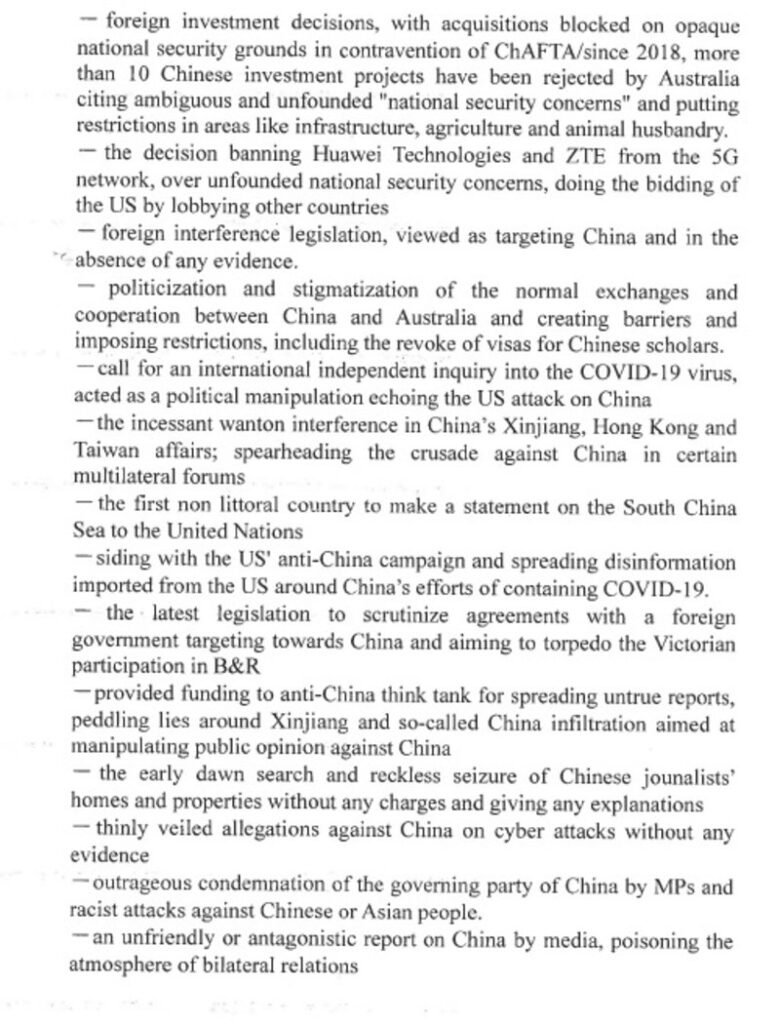Australia Foreign affairs Chief calls out China not to resort to coercion – arguing Beijing has more to gain through cooperation as the relationship continues to sour declaring that China would be wrong to assume it was now so powerful it could set the terms of its engagement with the world.

Australia Foreign affairs Chief Frances Adamson said China’s influence had risen as its economic weight had continued to grow, “challenging American power, influence and interests” and bringing strong growth in China’s military spending.
She said China’s economic recovery would be an important factor in “how the region and world emerges from what threatens to be a long and uneven recovery from the Covid recession”.
“But the questions around China are much more wide-ranging than simply its economic approach,” Adamson said at the Australian National University in Canberra.
“No power this large and globally integrated can escape scrutiny or debate.
“The rest of the world has done a lot of thinking about China’s power and what it means.
“But it is less apparent that China has carefully considered other countries’ reactions to its conduct internationally.
“China may have reached a point where it believes that it can largely set the terms of its future engagement with the world.
“If it has, I believe it is mistaken.
“There is far more to be gained for China and for everyone else through working constructively and collaboratively … without resort to pressure or coercion.”
China’s coercion has also been called out by US Ambassador to Australia Arthur Culvahouse Jr who accused the communist nation’s embassy of foreign interference after releasing a list of 14 grievances with Canberra – including the ban on Huawei, attempts to “torpedo” Victoria’s involvement in Belt and Road Initiative and calling for an independent inquiry into COVID-19.
“You would never see a US embassy hand such a list to a reporter in Australia,” he said.
Related Article Germany Forms An Alliance With Australia To Manage China’s Influence In Indo-Pacific Region
China has ‘very clear’ territorial ambitions
The Institute of Public Affairs’ Gideon Rozner says China has very clear territorial ambitions and and seem “hellbent on militarizing the South China Sea”.
He said the nation is willing to “mete out punishment to our industries via trade for the most minor of infractions”.
“I don’t think you can actually fill the bottomless pit that is the Chinese foreign policy ego.”

In dealing with China, Mr Rozner said it is going to be a “real tightrope exercise for Scott Morrison going forward as we lurch into the Asian century”.
Related Article With An Eye On China, US to Deploy New Naval Fleet In Indian Ocean
Earlier on 19-November 2020, The US government mocked a series of threats issued by China to the Morrison government, saying Beijing was effectively demanding that Australia surrender its sovereignty.
The National Security Council, which comprises the US President’s principal national security advisers and cabinet officials, took to Twitter after the Chinese embassy in Canberra took the unusual step of listing its grievances with Australia.
“Beijing is upset Australia took steps to expose and thwart Chinese espionage & to protect Aussie sovereignty,” the NSC tweeted.
“It’s encouraging to see a growing number of countries following Canberra’s lead in taking such steps, which Beijing helpfully lays out here.
“The Chinese Communist Party used to be more subtle in its attempts to interfere in the internal affairs of nations. Their ‘Wolf Warrior’ diplomacy is back firing; more and more nations worldwide have Australia’s back.”
Related Article China Holds Cargo Ships From Other Countries At Its Ports For Months While Expects Chinese Cargo To Be Cleared By Other Countries ASAP
A day earlier on 18-November 2020, Beijing had issued an extraordinary attack on the Australian government, accusing it of “poisoning bilateral relations” in a deliberately leaked document that threatens to escalate tensions between the two countries.
The government document goes further than any public statements made by the Chinese Communist Party, accusing the Morrison government of attempting “to torpedo” Victoria’s Belt and Road deal, and blaming Canberra for “unfriendly or antagonistic” reports on China by independent Australian media.
The dossier of 14 disputes was handed over by the Chinese embassy in Canberra.
The list of grievances also includes: government funding for “anti-China” research at the Australian Strategic Policy Institute, raids on Chinese journalists and academic visa cancellations, “spearheading a crusade” in multilateral forums on China’s affairs in Taiwan, Hong Kong and Xinjiang, calling for an independent investigation into the origins of COVID-19, banning Huawei from the 5G network in 2018 and blocking 10 Chinese foreign investment deals across infrastructure, agriculture and animal husbandry sectors.

Prime Minister Scott Morrison refused to be cowed.
“We won’t be compromising on the fact that we will set what our foreign investment laws are or how we build our 5G telecommunications networks or how we run our systems of protecting against interference Australia’s way we run our country.
“We won’t be changing any of that and I can tell you, in that list you would have seen that apparently the media and freely elected politicians aren’t allowed to speak their minds.
“We won’t be changing that in Australia either. So we’ll continue to be ourselves. We will stand up for our national interests but we’ll engage with our partners respectfully.”
Follow us at:-
Twitter Handle: @newscomworld
Instagram Handle: @newscomworld
Parler Handle: @NewsComWorld
Subscribe our : YouTube Channel https://www.youtube.com/channel/UCnKJQ3gFsRVWpvdjnntQoAA
Like our Facebook Page https://www.facebook.com/NewsComWorld
1,150 total views






